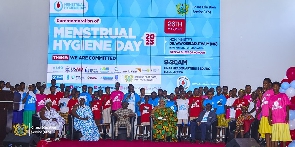May 28 since 2014 has observed as Menstrual Hygiene (MH) Day. MH Day is a global advocacy platform that brings together the voices and actions of non-profits, government agencies, individuals, the private sector and the media to promote good menstrual health and hygiene (MHH) for all girls and women.
Many studies argue that inadequate sanitary facilities affect girls’ experiences at school, causing them to miss classes during their menstruation or even drop out. Schools that have female- friendly facilities and information on menstruation integrated into school curriculum for both girls and boys can reduce stigma and contribute to better health and educational outcomes.
The commemoration of MH Day on May 28 has a lot of significance. This is because through awareness creation, we are able to talk about menstruation publicly and gradually breaking the silence, changing negative social norms around MHH, and engage decision-makers to increase political priority and catalyse action for MHH, at global, national, regional, district and community levels.
Theme
The theme for the 2023 celebration Centre’s around commitment thus ‘#WeAreCommitted’. This emphasises on ensuring good menstrual health and hygiene which is central to advancing gender equality not leaving out the vulnerable.
Objectives
The objectives for this year’s commemoration are:
increase access to advocacy to end stigmatisation
increase access to advocacy and seeking the commitment of duty bearers
increase access to education and information on menstruation
increase and improve access to proper menstrual care and sanitary products
ending period poverty through advocacy
For the last three years, the MH Day movement has been calling for more action and investment in menstrual health and hygiene using the slogan 'Its Time For Action' as a rallying cry.
To step up the campaign, we are now shifting from calling for action to leading by example by committing to action. Now using the slogan, We Are Committed, organisations all over the world will start to publicly announce what they are committed to contribute to create a world where no one is held back because they menstruate by 2030. By making public commitments, we will increase transparency, provide a basis for accountability and encourage others to follow our example.
As a country, it is time we prioritise the following:
Provision of equitable toilet facilities which are gender and disability friendly with changing rooms in all schools and government offices.
Easy accessibility of menstrual hygiene products by reducing or removing tax on
menstrual products.
Provision of good quality water for drinking and promoting hygiene.
Encouraging the production of bio-degradable disposable sanitary pads.
Coordination by the National Technical Committee on MHM
The event is being coordinated by the National Technical Committee on MHM. The members include representatives from the Ghana Education Service, Ministry of Gender, Children and Social Protection, the Ministry of Education, the Ministry of Health / Ghana Health Service, the Ministry of Sanitation and Water Resources. Other partners are UNICEF, Greater Accra Metropolitan Area (GAMA) Sanitation and Water Project, World Bank, World Vision Ghana, WaterAid Ghana, Global Communities, Plan International Ghana, Catholic Relief Service,
Rotary Action Group on Menstrual Health and Hygiene (RAGMHH), Naa Adole Foundation and CONIWAS.
Proposed MH Day activities
The following are some proposed activities to be held before, during and after the commemoration.
National level
Virtual seminars for adults and school children
Influencers supporting through their followers and also informing the general public to watch broadcast on MHM.
Donations of sanitary pads either re-usable or single-use disposable to girls including vulnerable groups such as the learners with special needs
Engagement with Parliamentary Select Committee on Education and Works and Housing
Engagement with the leadership of the women caucus in parliament to push for the abolition of the taxes.
Documentary on successes of MHM interventions
Making and wearing of a menstrual bracelet. The menstrual bracelet could also be made and distributed to include Special schools. The Menstruation Bracelet consists of 28 beads, 5 of which are red.
Regional, District and School levels
Go on float as part of awareness and advocacy
Queenmothers give talk or hold discussions to groups
Donations of sanitary pads either re-usable or single-use disposable to girls including vulnerable groups such as the learners with special needs
Teachers organise school children to sew re-usable sanitary pads for exhibitions. Consider other activities such as making of menstrual bracelets, drama and drawings to mark the day.
Drawing competition
Awareness creation through community radio stations and other communication channels.
Sub national activities to be conducted at the Regional, District school levels and in communities.
Making and wearing of a menstrual bracelet. The menstrual bracelet could also be made and distributed to include Special schools. The Menstruation Bracelet consists of 28 beads, 5 of which are red.
Members of the National Technical Committee on MHM and the The Management of Ghana Education Service (GES) are committed to ensuring that the school and the community provide the needed enabling environment to make menstruation an amazing experience for girls women.
Together we can make sure all girls and boys are educated about menstruation.
Everyone has a role to play; parents, teachers, government at national and decentralised levels to support girls and women.
We need to step up action and investment in menstrual health and hygiene now!


General News of Saturday, 27 May 2023
Source: GES

















